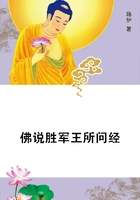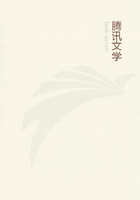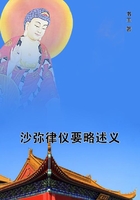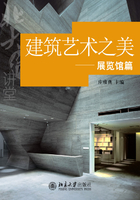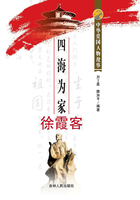In connection with the practical side of things this particular must also be noted, that when the feeling of right, the concrete practical mind, and, speaking generally, humanity and happiness were made the principle, this principle, universally conceived, had certainly the form of thought; but in the case of such concrete content derived from our impulse or inward intuition, even though that content were religious, the thought itself was not the content. But now this further phase appeared, that pure thought was set up as the principle and content, even if again there was lacking to this content the true consciousness of its peculiar form for it was not recognised that this principle was thought. We see it emerge in the sphere of will, of the practical, of the just, and so apprehended that the inner-most principle of man, his unity with himself, is set forth as fundamental and brought into consciousness, so that man in himself acquired an infinite strength. It is this that Rousseau from one point of view said about the state. He investigated its absolute justification, and inquired as to its foundation. The right of ruling and associating, of the relation of order, of governing and being governed, he apprehends from his own point of view, so that it is made to rest historically on power, compulsion, conquest, private property, &c.(9)Rousseau makes free-will the principle of this justification, and without reference to the positive right of states he made answer to the above question (chap. iv. p. 12), that man has free-will, because “liberty is the distinguishing feature of man. To renounce his liberty signifies to renounce his manhood. Not to be free is therefore a renunciation of a man's rights as a human being, and even of his duties.” The slave has neither rights nor duties. Rousseau therefore says (chap. vi. p.
21): “The fundamental task is to find a form of association which will shield and protect with the power of the whole commonwealth combined the person and property of every one of its members, and in which each individual, while joining this association, obeys himself only, and thus remains as free as before. The solution is given by the Social Contract;” this is the association of which each is a member by his own will. These principles, thus abstractly stated, we must allow to be correct, yet the ambiguity in them soon begins to be felt. Man is free, this is certainly the substantial nature of man; and not only is this liberty not relinquished in the state, but it is actually in the state that it is first realised. The freedom of nature, the gift of freedom, is not anything real; for the state is the first realisation of freedom.
The misunderstanding as to the universal will proceeds from this, that the Notion of freedom must not be taken in the sense of the arbitrary caprice of an individual, but in the sense of the rational will, of the will in and for itself. The universal will is not to be looked on as compounded of definitively individual wills, so that these remain absolute; otherwise the saying would be correct:
“Where the minority must obey the majority, there is no freedom.” The universal will must really be the rational will, even if we are not conscious of the fact; the state is therefore not an association which is decreed by the arbitrary will of individuals. The wrong apprehension of these principles does not concern us. What does concern us is this, that thereby there should come into consciousness as content the sense that man has liberty in his spirit as the altogether absolute, that free-will is the Notion of man. Freedom is just thought itself; he who casts thought aside and speaks of freedom knows not what he is talking of. The unity of thought with itself is freedom, the free will. Thought, as volition merely, is the impulse to abrogate one's subjectivity, the relation to present existence, the realising of oneself, since in that I am endeavouring to place myself as existent on an equality with myself as thinking. It is only as having the power of thinking that the will is free. The principle of freedom emerged in Rousseau, and gave to man, who apprehends himself as infinite, this infinite strength. This furnishes the transition to the Kantian philosophy, which, theoretically considered, made this principle its foundation; knowledge aimed at freedom, and at a concrete content which it possesses in consciousness.
1. Emile ou de l'éducation, T. II. (Paris, 1813, él. stéréotype), Book IV., Profession de foi du vicaire savoyard, p. 215 seq.
2. Buhle: Lehrbuch der Geschichte der Philosophie, Pt. VIII. pp. 62, 63: Système de la Nature par Mirabaud (Londres, 1770), T. I. chap. i. p. 10; chap. ii. p 28.
3. Buhle: Lehrbuch der Geschichte der Philosophie, Pt. VIII. pp. 63, 64. Système de la Nature, T.
I. chap. ii. pp. 18, 16, 21, et 15.
4. Buhle, ibidem, pp. 64, 65, 70; Système de la Nature, T. I. chap. ii, pp. 30, 31; chap. iii, pp. 39, 40; chap. iv. pp. 45, 46; chap. vii, pp. 90, 91.
5. Robinet: De la Nature (Troisième édition, Amsterdam, 1766), T.I.P.I. chap. iii. iv. pp. 16, 17.
6. Robinet: De la Nature, T.I.P.II. chap. ii. pp. 156, 157; chap. vii. pp. 166, 168; chap. ix.-xi.;chap. xv. pp. 202, 203; chap. xix. p. 217.
7. Robinet: De la Nature, T.I.P.I. chap. xxviii. p. 138; chap. xiii. p. 70.
8. Helvetius: De l'esprit (Oeuvres complètes, T. II. Deux-Ponts, 1784), T. I. Discours II. chap. i.
pp. 62-64; chap. ii. pp. 65, 68, 69; chap. iv. p. 90; chap. v. p. 91; chap. viii. p. 114; chap. xxiv.
pp. 256, 257.
9. Rousseau: Du contrat social (Lyon, 1790), Book I. chap. iii. pp. 8, 9; chap. iv. pp. 10, 11, 13-16.
Section Two: Period of the Thinking Understanding Chapter II. - Transition Period

